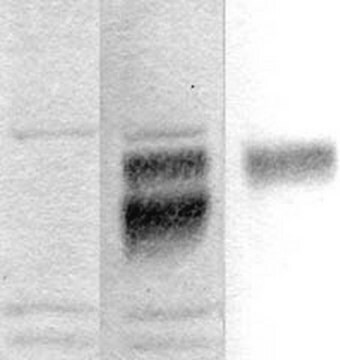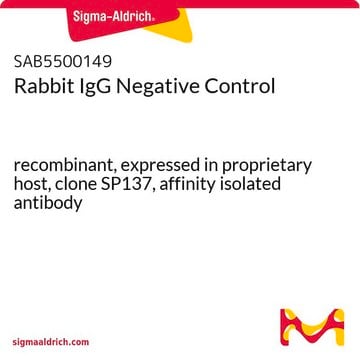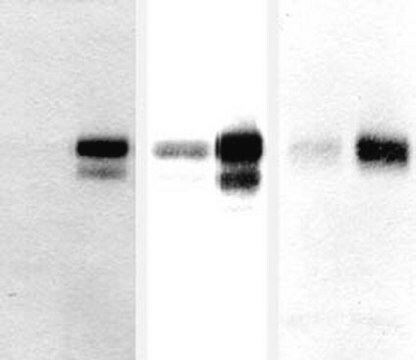MABN381
Anti-APP-C99 Antibody, clone mC99(1-7)
ascites fluid, clone mC99(1-7), from mouse
Synonyme(s) :
Amyloid beta A4 protein, ABPP, APPI, APP, Alzheimer disease amyloid protein, Cerebral vascular amyloid peptide, CVAP, PreA4, Protease nexin-II, PN-II
About This Item
Produits recommandés
Source biologique
mouse
Niveau de qualité
Forme d'anticorps
ascites fluid
Type de produit anticorps
primary antibodies
Clone
mC99(1-7), monoclonal
Espèces réactives
human, mouse
Technique(s)
immunocytochemistry: suitable
immunohistochemistry: suitable
immunoprecipitation (IP): suitable
western blot: suitable
Numéro d'accès NCBI
Numéro d'accès UniProt
Conditions d'expédition
wet ice
Modification post-traductionnelle de la cible
unmodified
Informations sur le gène
human ... APP(351)
Description générale
Immunogène
Application
Immunohistochemistry Analysis: A representative lot detected APP-C99 in APPS1 mice and in human Alzheimer brain tissues
(Houacine, J., et al. (2012). Neurobiol Aging. 33(11):2704-2714.).
Immunofluoresence Anlaysis: A representative lot detected APP-C99 in HEK APPSwe cells (Houacine, J., et al. (2012). Neurobiol Aging. 33(11):2704-2714.).
Neuroscience
MMPs & TIMPs
Qualité
Western Blotting Anlaysis: A 1:2,000 dilution of this antibody detected APP-C99 in 10 µg of DAPT treated HEK293 cell lysate.
Description de la cible
Forme physique
Stockage et stabilité
Handling Recommendations: Upon receipt and prior to removing the cap, centrifuge the vial and gently mix the solution. Aliquot into microcentrifuge tubes and store at -20°C. Avoid repeated freeze/thaw cycles, which may damage IgG and affect product performance.
Clause de non-responsabilité
Not finding the right product?
Try our Outil de sélection de produits.
Code de la classe de stockage
12 - Non Combustible Liquids
Classe de danger pour l'eau (WGK)
nwg
Point d'éclair (°F)
Not applicable
Point d'éclair (°C)
Not applicable
Certificats d'analyse (COA)
Recherchez un Certificats d'analyse (COA) en saisissant le numéro de lot du produit. Les numéros de lot figurent sur l'étiquette du produit après les mots "Lot" ou "Batch".
Déjà en possession de ce produit ?
Retrouvez la documentation relative aux produits que vous avez récemment achetés dans la Bibliothèque de documents.
Notre équipe de scientifiques dispose d'une expérience dans tous les secteurs de la recherche, notamment en sciences de la vie, science des matériaux, synthèse chimique, chromatographie, analyse et dans de nombreux autres domaines..
Contacter notre Service technique








